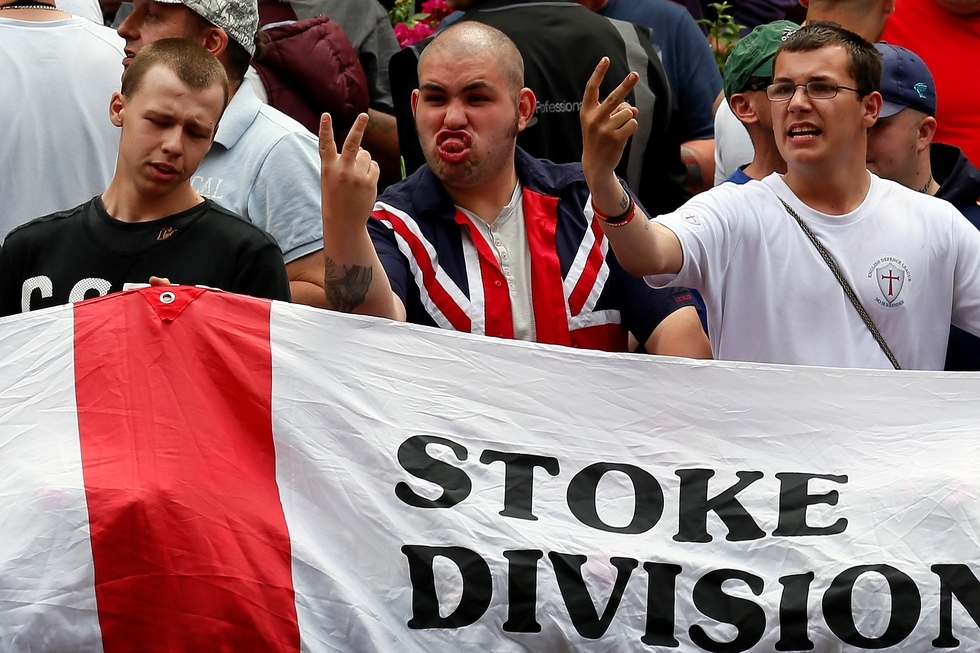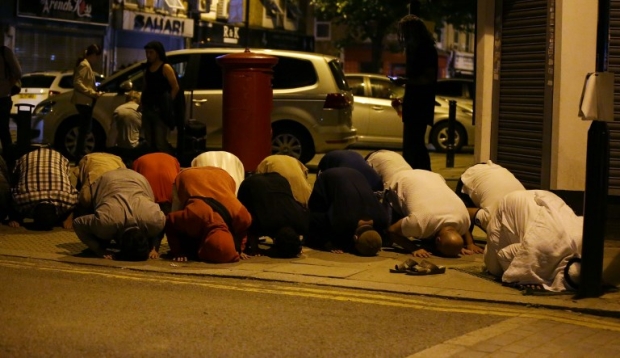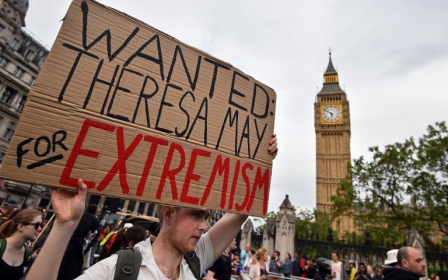A message of hate against Muslims: When will the UK government stop it?

Once upon a time, in 2018, there was a letter, and it was posted into homes on the streets of Leicester, London, Sheffield, Bradford and Cardiff.
Recipients of the letter also included the offices of four Muslim members of parliament, to whom it was posted in packages which police described as containing a "low-level noxious substance".
Targeting areas deemed to have high Muslim populations, its anonymous sender(s) set out a chart of who and what to attack, as well as how, and then awarded points for these endeavours.
Almost half a million people experienced a violent attack during the period covered by the survey
Thus, 10 points for verbally abusing a Muslim, 25 points for pulling a headscarf off a Muslim "woman" (complete with scare quotes), and 2,500 points for nuking Mecca (as a friend on Facebook pointed out with dark humour that this was a tad stingy, given the logistics needed to carry out the latter in comparison with the former).
The wide-ranging impacts of hate crimes
All attempts to alleviate the tension aside, this is a genuinely terrifying experience for anyone on the receiving end and for Muslims everywhere in the UK, for hate crimes have power beyond their initial victims. Hate crimes are message crimes, sending a message of hatred to the whole community.
Saied Reza Ameli and I have frequently written about it, and the Organisation for Security and Cooperation in Europe guide on the impact of individual acts of hatred notes:
"Hate crimes and hate-motivated incidents frequently leave victims in fear of future attacks and of increased violence. This fear comes from the rejection of the victims’ identity that is implicit in hate crimes. Additionally, hate crimes send the message that victims are not an accepted part of the society … An unhelpful or denigrating response to victims of hate crimes can cause further harm to already traumatised people. This secondary victimisation can occur, in particular, when representatives from broader society, such as police, social-service professionals, doctors or judges deny or minimise the seriousness of reported hate crimes.”
So for one hate crime - just the one - this is the impact. What, then, of something executed on this scale with a perverse impressiveness; note that, contrary to many forms of anti-Muslim hate mail, the writer(s) of the above letter seem a tad more literate, or at least sensible enough to get the missive proofread? What, then, is the message Muslims are being sent?
It's worth first looking through various tweets and social media posts from people who received or knew someone who had received such a letter. There are frequent queries as to whether this letter might be a hoax.
What exactly this means is unclear. Does it mean that sending a threatening letter, without intent to actually do what has been suggested in it, cancels out the threat? Is it just that the letter is so vile, there is (unbelievably) more than a modicum of disbelief? So much so, that maybe it's easier to believe that a Muslim has done this to provoke … what, exactly, I am not sure.
Abuse of Muslims on the rise
It reminds me of the many cases where victims are accused of fabricating racist harassment campaigns against themselves (see the example of Ms Yasmin, an old Islamic Human Rights Commission advocacy case from the late 1990s, as just one small example).
Muslims are punished every day in their social interactions and through their increasing vilification by state policy, law, political discourse and the media.
The message that you are not safe in your own homes has come through the letterbox
IHRC survey results from 2015 showed that 18 percent of Muslims surveyed had experienced a violent hate attack. It doesn't sound so dramatic, except when you understand that 18 percent of the 2.7 million Muslims, if we extrapolate, means potentially that almost half a million people experienced a violent attack during the period covered by the survey.
Add to that the other types of experiences: 66 percent had suffered verbal abuse, up from 40 percent in 2010. Add to that the bombardment of anti-Muslim tropes via TV, newsprint, film and political narratives, and every day is "Punish a Muslim Day."
All the while, as the recent letter showed us, we are not considered human ourselves; why else put the term woman in inverted commas? Muslims are deemed guilty of crimes against the general population, and while the message is meant to victimise and intimidate them personally, there is a wider message too.
Ripped from the fascist playbook
This letter is also a message to a perceived homogenous majority who could interpret this as permission to take the "law" into their own hands. It precedes and incites violence en masse, just as Brexit has been shown to do.
Even the Metropolitan police laid the catastrophic and unprecedented spike in violence against minorities at the door of the referendum result. A Bosnian friend, who had lived through levels of anti-Muslim narratives of dehumanisation that resulted in genocide in her home country, described that Brexit moment – the day after – as something akin to Kristallnacht (a Nazi pogrom throughout Germany and Austria in 1938, during which Jews were killed and their property destroyed).
It's a difficult point to make. This week's list of Muslim punishments makes the point ever more real, and sadly it finds an audience.
Indeed, some of the letter's exhortations come straight out of the fascist playbook in terms of street attacks, updated to include things like hijab-ripping and acid attacks, both employed against Muslims in the recent past. However, the calls to violence extend to electrocution, skinning and racking.
Electrocution marked the Muslim experience of torture at the hands of the French in Algeria, and it was used by the US in Abu Ghraib and many sites of the so-called War on Terror. This is just part of the never-ending history of racking, skinning and other forms of torture; some days it seems we will never escape the long 16th century.
Most chillingly, this epistle exhibits what many of us have argued for a long time: that anti-Muslim hatred is institutional and operates as a form of domination. Its exhortations clearly move from what can be done on the street to what can only be (and has only been) perpetrated by the state. Bar the nuclear annihilation of Mecca, what hasn’t been done on this list already? And yet the government remains silent.
We know the power of letters in the political psyche in this country, for once upon a time, there was a letter, and it alleged a Trojan Horse conspiracy in UK schools; that was indeed a confirmed hoax, and yet policies, laws and retribution came aplenty.
The message that you are not safe in your own homes has come through the letterbox. The question remains as to whether the powers that be will do anything at the despatch box.
- Arzu Merali is a writer and researcher based in London. She is one of the co-founders of the Islamic Human Rights Commission (http://www.ihrc.org.uk) and co-authored its recent study Environment of Hate: The New Normal for Muslims in the UK with Saied Reza Ameli. She is currently working on the multi-partner project ‘Counter-narratives to Islamophobia Toolkit’ with the University of Leeds.
The views expressed in this article belong to the author and do not necessarily reflect the editorial policy of Middle East Eye.
Photo: Supporters of the right-wing and anti-Islamist English Defence League (EDL) protest in Birmingham on 20 July 2013 (REUTERS)
New MEE newsletter: Jerusalem Dispatch
Sign up to get the latest insights and analysis on Israel-Palestine, alongside Turkey Unpacked and other MEE newsletters
Middle East Eye delivers independent and unrivalled coverage and analysis of the Middle East, North Africa and beyond. To learn more about republishing this content and the associated fees, please fill out this form. More about MEE can be found here.






